List of the oldest buildings in Connecticut
See also: Oldest buildings in America
This article attempts to list the oldest buildings extant in the U.S. state of Connecticut, including the oldest houses and any other surviving structures. Construction dates are based upon tax records, dendrochronology, architectural studies or other public records. If the exact year of initial construction is estimated, it will be shown as a range of dates. Location is the original township where building was constructed.
This list is incomplete; you can help by expanding it.
| Building | Image | Township | Built | Notes |
|---|---|---|---|---|
| Henry Whitfield House |  |
Guilford | 1639 | Oldest surviving stone American Colonial house in New England, museum since 1899.[1] |
| Captain David Judson House | 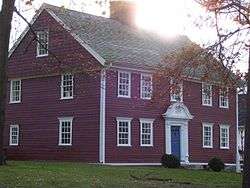 |
Stratford | 1639–1723 | Stone fireplace and foundation (cellar) from 1639, later Georgian Architecture modifications, Stratford Historical Society museum.[2][3][4] |
| Loomis Homestead | 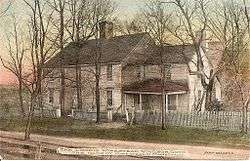 |
Windsor | 1640–1688 | Ell from 1640, main house from 1688, oldest wooden house in Connecticut, now Loomis Chaffee School. |
| Thomas Wheeler House | 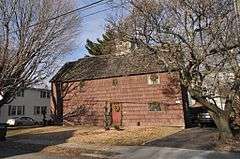 |
Fairfield | 1644–1680 | Core from 1644, expanded 1680, oldest house in Bridgeport Black Rock Harbor, residence. |
| Comfort Starr House | 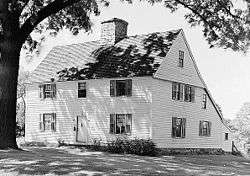 |
Guilford | 1645–1695 | Original oak clapboard in lean-to attic, residence.[5] Dendrochronology in 2014 confirmed a construction date of 1695.[6] |
| Thomas Lee House | .jpg) |
Lyme | 1660–1664 | Began as a one-room house, oldest wooden saltbox still in its primitive state, museum since 1897.[7] |
| Deacon John Moore House | 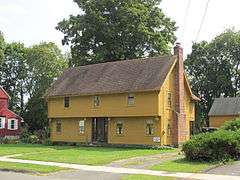 |
Windsor | 1664 | Moore was also a woodworker known for using the foliated vine design, which depicts vines and blossoms carved in shallow relief with flat surfaces. |
| Ephraim Hawley House | |
Stratford | 1670–1690 | Began as a 1 1/2 story Cottage, original oak clapboard lean-to attic, saltbox residence.[8][9][10] |
| Stanton-Davis Homestead Museum | |
Stonington | 1670–1700 | A working farm for the last 340 years. |
| Nehemiah Royce House | 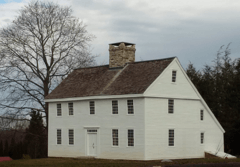 |
Wallingford | 1672 | Saltbox, General George Washington slept here in 1775, once a residence for Choate Rosemary Hall.[11] |
| Elisha Bushnell House | Old Saybrook | 1678 | The Colonial property includes two contributing buildings, the second being termed the "Slave House". | |
| Joshua Hempsted House |  |
New London | 1678 | One of the earliest documented houses in Connecticut, now a museum.[12] |
| Parker House | Old Saybrook | 1679 | Deacon William Parker House. | |
| Swain-Harrison House |  |
Branford | 1680–1724 | Saltbox with overhang serves as the Branford Historical Society museum.[13] |
| Deacon John Graves House | 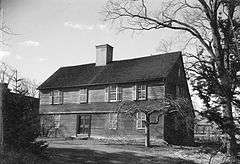 |
Guilford | 1681 | Saltbox saved from demolition and fully restored in 1983 by a private foundation, now a museum in Madison.[14] |
| Zachariah Curtiss Houses | |
Stratford | 1686–1721 | Early Georgian architectural style, residence.[8][9] |
| Acadian House | 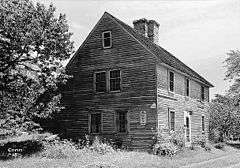 |
Guilford | 1690 | Saltbox named after the Acadians who lived there following 1755 deportation from Canada.[15] |
| Hyland House | 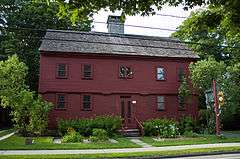 |
Guilford | 1690–1713 | Saltbox with framed overhang, now a museum.[16] Dendrochronology in 2014 confirmed a 1713 construction date.[17] |
| Thomas Lyon House | |
Greenwich | 1690 | Oldest unaltered saltbox house in Greenwich. |
| Meigs-Bishop House | 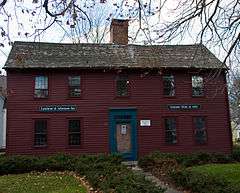 |
Guilford | 1690 | English tea room in Madison.[18] |
| Jonathan Murray House | 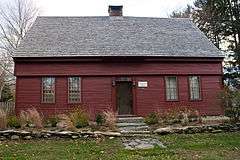 |
Guilford | 1690 | Private residence in Madison listed on the NRHP |
| John Whittlesey Jr. House | 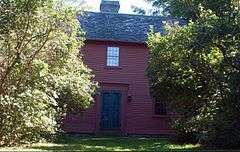 |
Old Saybrook | 1693 | Private residence listed on the NRHP. |
| General David Humphreys House | 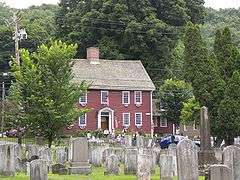 |
Ansonia | 1695–1698 | Home of the first U.S. Ambassador, now a museum. |
| Hoyt-Barnum House | 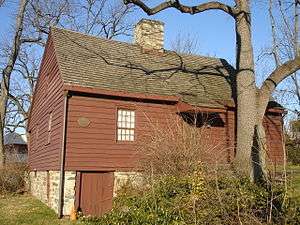 |
Stamford | 1699 | Early Cape Cod Cottage, Stamford Historical Society museum.[19] |
| Eells-Stow House |  |
Milford | 1700–1720 | Served as a hospital during Revolutionary War, now a museum.[20] |
| Pond-Weed House | 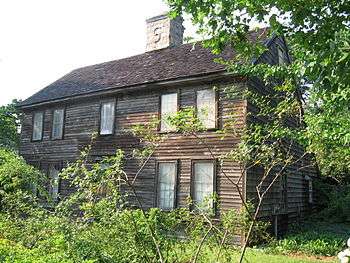 |
Darien | 1700 | Saltbox residence. |
| Samuel Huntington Birthplace | .jpg) |
Scotland | 1700–1722 | Saltbox home of a signer of the Declaration of Independence and Governor of Connecticut, now a museum.[21] |
| Stanley-Whitman House | .jpg) |
Farmington | 1709–1720 | Saltbox with framed overhang style with carved pendants, now a museum.[22] |
| John Tyler House |  |
Branford | 1710 | Private residence listed on the NRHP. |
| Buttolph-Williams House | 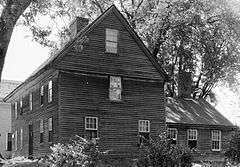 |
Wethersfield | 1711 | Connecticut Landmark museum.[23] |
| Black Horse Tavern (Old Saybrook, Connecticut) | 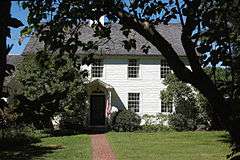 |
Old Saybrook | 1712 | Private residence listed on the NRHP.[24][25] |
Notes
- ↑ Historic Houses of Early America, Elsie Lathrop, Kessinger, New York, 2006 page 305
- ↑ History of the Old Town of Stratford, Connecticut, Samuel Orcutt, Fairfield Historical Society, 1886, Vol. I, page 89
- ↑ Stratford Historical Society website retrieved on 2009-05-11
- ↑ WPA Architectural Survey Connecticut State Library
- ↑ Connecticut: A Guide to its Roads, Lore and People, Federal WPA Project, 1938 page 165
- ↑
- ↑ East Lyme Historical Society website retrieved on 2009-05-11
- 1 2 W.P.A. Federal Writers Project, State of Connecticut 1935-1942
- 1 2 Geoffrey Rossano PhD, Historic and Architectural Resource Survey of Trumbull, Connecticut, produced for the Connecticut Historical Commission, Hartford, CT, 2002
- ↑ Heather Jones and Bruce Harvey,PhD, S&ME, Inc., Historic and Architectural Survey of the Town of Trumbull, Fairfield County, Connecticut, Produced for the Connecticut Commission on Culture and Tourism, Hartford, CT, 2010
- ↑ Wallingford Historical Society website retrieved on 2009-05-11
- ↑ Connecticut Landmarks website retrieved on 2009-05-12
- ↑ Branford Historical Society website retrieved 2009-05-11
- ↑ Deacon John Graves Foundation website retrieved on 2009-05-17
- ↑ Acadians-Guilford Albert Lafreniere website retrieved on 2009-05-13 website
- ↑ Hyland House Museum website retrieved 2009-05-11
- ↑
- ↑ Front Parlour website retrieved on 2009-05-13
- ↑ Stamford Historical Society website retrieved on 2009-05-12
- ↑ Milford Historical website retrieved on 2009-05-12
- ↑ Samuel Huntington Birthplace website retrieved on 2009-05-11
- ↑ Stanley-Whitman Museum website retrieved on 2009-05-11
- ↑ CT Landmarks website retrieved on 2009-05-11
- ↑ NRHP Inventory-Nomination: Black Horse Tavern
- ↑ Accompanying 10 photos, exterior and interior, from 1978
This article is issued from Wikipedia - version of the 11/16/2016. The text is available under the Creative Commons Attribution/Share Alike but additional terms may apply for the media files.